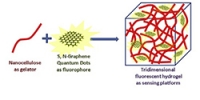Scientists develop a new catalyst using glycerol produced during biodiesel manufacture
Escrito por UCC+iThe process uses a microwave heating technique
Due to its environmental benefits, the production of biodiesel as an alternative to fossil fuels has expanded exponentially over the last few years. Glycerol is among the by-products of the manufacturing process; for every ton of biodiesel produced, the process generates 100 kg of glycerol. Unfortunately, however, glycerol has few direct uses, since it contains high levels of impurities.
Research reveals the efficacy of a new antibiotic active against pneumonia
Escrito por UCC+iA research group at the Department of Biochemistry and Molecular Biology, University of Córdoba, has studied the effects of rhodomyrtone on pneumococcal strains.
The emergence of antibiotic resistance in some of the most common pathogenic bacteria affecting humans has become a healthcare problem worldwide. Due to natural selection, the mere use of antibiotics against a pathogenic bacterial species eventually prompts them to develop resistance to those antibiotics.
Development of an easy-to-use eco-friendly fluorescent enzyme detection platform
Escrito por UCC+iThe platform, developed by a research group at the University of Córdoba Department of Analytical Chemistry, has been tested measuring laccase enzyme concentrations in various shampoo samples.
Enzymes are amongst the most widely-used biocatalysts, applicable – thanks to their broad range of properties – in a whole range of fields. There is thus a need for efficient enzyme detection methods.
‘Vortex’ beams for the manipulation of nanoparticles
Escrito por UCC+iA lecturer at the University of Córdoba has developed a new method, published in Physical Review Letters, to simplify the process and reduce the cost of manipulating nanometric materials
One millionth of a millimetre: this is the scale at which nanotechnology manipulates matter. Given its many applications, nanotechnology has already had a major impact on recent technological progress; yet its real potential is yet to be discovered, and few scientists doubt that it will lead mankind to a new industrial revolution. A few days ago, University of Córdoba physics lecturer Pedro Rodríguez García published a paper in Physical Review Letters, reporting on the development of a new mechanism which simplifies and reduces the cost of manipulating nanoparticles.
The force behind the accelerated expansion of the universe changes over time
Escrito por UCC+iA study published in Nature Astronomy, by an international team including a lecturer at UCO, reveals that the properties characteristic of the mysterious dark energy have varied over the course of history
Hailed by some as a driving force because it causes the accelerating expansion of the universe, dark energy makes up around three quarters of the cosmos, yet little is known about it. The researchers who discovered dark energy six years ago were awarded the Nobel prize, and since then the scientific community has ceaselessly sought to decipher its secrets, which may yield important clues regarding the origin and fate of the cosmos.






